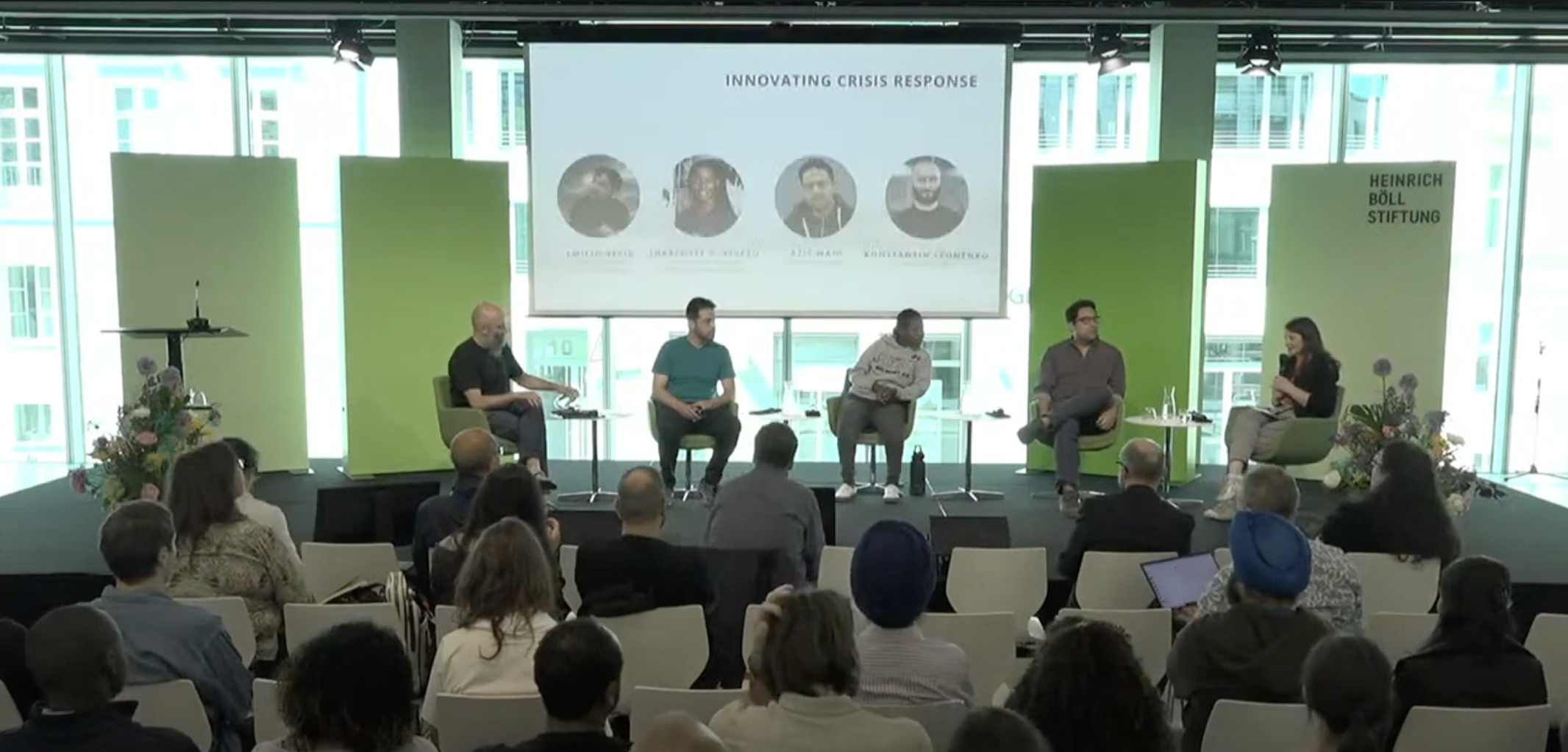Crisis response refers to the actions and measures taken to address and mitigate the impact of a crisis or emergency situation. It involves a coordinated effort by individuals, organizations, and authorities to manage the immediate challenges and provide assistance to those affected. Crisis response typically includes activities such as assessing the situation, mobilizing resources, implementing emergency plans, providing medical aid and support, ensuring public safety, and coordinating communication and information dissemination. The goal of crisis response is to minimize the negative consequences of the crisis and restore stability and resilience to the affected individuals and communities.
The panellists on stage discussed a wide range of topics regarding crisis response. We started with Konstantine, who talked about the different methods of operations and tools in the Tolocar project that aimed to support Ukraine citizens as cultural relief during the War. Aziz Wadi, moves on to speak about how to use innovation and think about the proper ways to respond to crises. He states, when we begin to understand the concept of focusing on questioning the “right ways,” it leads us to transition from mere prototyping to a form of production tailored to specific needs. Focusing on local needs gives us insights into what people genuinely require and desire in their particular environments. As a result, we can adapt and modify our production to align with the unique contexts and circumstances on the ground. This approach empowers us to bring about meaningful changes based on existing conditions and demands, ensuring our creations are more attuned to the realities and preferences of the communities they serve.
Next, Emilio Veris as he discusses his point of view when navigating international development with technology for prevention, mitigation, and in general, crisis prevention. He discusses an interesting fact about the nature of a “saviour complex that can come with being a maker.” Makers or creators may believe that their solutions or innovations are the ultimate answers to problems others face. This mindset can lead to a sense of superiority or an overly altruistic approach, where makers must rescue or save others with their creations. Makers need to be mindful of this tendency and approach their work with humbleness, empathy, and a genuine understanding of the needs and perspectives of the communities they aim to assist. Good ideas take time to create, and we need to plan accordingly with funding and resources to make the tools we use for responding to crises last.
The challenge of insufficient therapists or psychologists in refugee camps urges us to explore how we can address this gap. Charlotte Kigezo speaks on how while we emphasize open spaces and a culture of creation, we must also consider mental health and well-being in these environments. Caring for those helping others in critical spaces, experiencing war zones, strict regulations, and oppression is vital. In response to this concern, Charlotte and other response members initiated “Training of Trainers” in refugee camps focusing on community mental health. They realized that teaching technology to traumatized children or girls with low self-esteem required a compassionate approach; their trauma is a hindering factor that makes it harder to digest information. People can’t move on to better things if they don’t heal. The collaboration of Rogue Agency, #ASKnet, and GIG aimed to create spaces that make community members feel valued and human despite the hardships they’ve endured. In these spaces, healing conversations unfold; these spaces offer a sense of dignity, respect, and belonging, allowing refugees to connect with their humanity beyond the challenges of their past experiences. To acknowledge the interplay between psychology and technology, recognizing that the mind and brain are integral to our well-being.
Effective crisis response often requires collaboration with both traditional organizations and innovative makers. In times of crisis or emergency, actions and measures are taken to address the immediate challenges and mitigate the impact on affected individuals and communities. This coordinated effort involves various entities, including individuals, organizations, and authorities, who work together to assess the situation, mobilize resources, and implement emergency plans. Crisis response encompasses providing medical aid and support, ensuring public safety, and coordinating communication and information dissemination. By interfacing with more established networks and traditional organizations, the response becomes more productive and focused on addressing the most critical needs. Additionally, makers play a crucial role in crisis response by contributing their problem-solving skills and innovative solutions. The ultimate goal of crisis response is to minimize the negative consequences and restore stability and resilience to those affected by the crisis, demonstrating the power of collective action and innovation in times of adversity.


